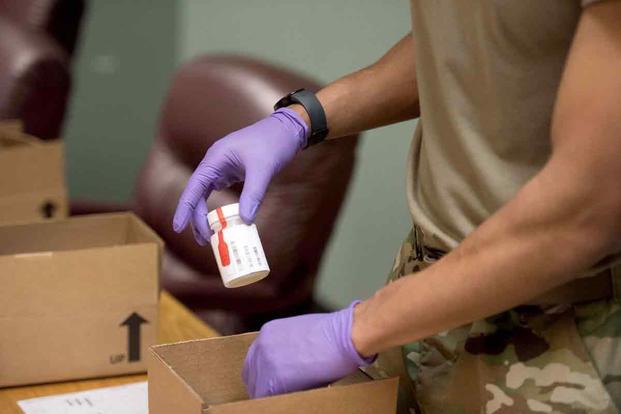Potential military recruits and prospective officers soon may not need to worry about drug testing if they recently used marijuana.
A provision included in the draft text of a must-pass defense policy bill released this week would prohibit the military from making someone take a test for cannabis as a condition for enlisting or commissioning into the military.
The provision, which still has to survive several legislative steps before becoming law, comes as policies and laws about marijuana are being relaxed around the country, including a move by the federal government this week to ease restrictions on marijuana use.
As the military services continue to struggle with recruitment in part because a large number of young Americans are ineligible to serve, military officials and some lawmakers have looked to soften a leading barrier to entering service: past marijuana use.
A poll released by Gallup last month found 12% of Americans aged 18 through 29 -- the demographic most aligned with prime military recruiting age -- said they used marijuana regularly, defined as at least 10 days per month.
Recreational marijuana use has been legalized in 23 states, and 38 states allow it for medical use. But the drug remains illegal at the federal level, and past use is still technically disqualifying for military service.
A move by the federal government this week could further ease Americans' access to the drug, though. On Thursday, the Justice Department announced it was moving forward with the process to reclassify marijuana as a less dangerous drug.
The Justice Department's move wouldn't legalize marijuana for recreational use, but it would recognize that there are accepted medical uses for the drug and put it in a category of substances that are allowed to be prescribed under highly regulated circumstances.
"This is monumental," President Joe Biden said in a video statement Thursday touting the Justice Department announcement. "Far too many lives have been upended because of a failed approach to marijuana, and I'm committed to righting those wrongs. You have my word on it."
The provision in this year's House Armed Services Committee draft of the National Defense Authorization Act, or NDAA, to end cannabis testing for enlistment and commissioning comes after the military branches have taken their own steps to make past marijuana use less of a barrier to joining up.
The Air Force is still in the middle of a pilot program that has proven popular and allows recruits who test positive for marijuana to retest. The Navy also recently announced it is expanding its program to grant waivers to recruits who test positive for marijuana. The Army, too, has a waiver program.
This year's NDAA provision mirrors an amendment that was proposed by committee member Rep. Matt Gaetz, R-Fla., for last year's version of the defense bill. Gaetz's amendment last year never got a vote.
Inclusion in the base text of the bill this year greatly increases its odds of becoming law. But it will need to survive next week's committee debate, debate on the House floor in the coming weeks and negotiations with the Senate over the summer, and some Republicans continue to oppose any effort to relax rules around marijuana.
Still, lawmakers in both parties have been increasingly shifting their attitudes toward drugs once considered taboo. While last year's NDAA did not touch marijuana policy, the bill as signed into law did direct the Pentagon to fund a study on the use of psychedelic drugs as a treatment for post-traumatic stress disorder and traumatic brain injury.
Related: Navy Now Forgiving Recruits' Prior Marijuana Use as It Looks to Cut More Losses at Boot Camp













